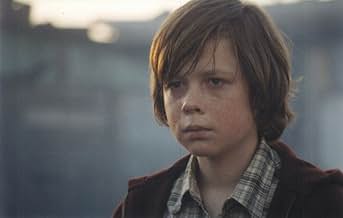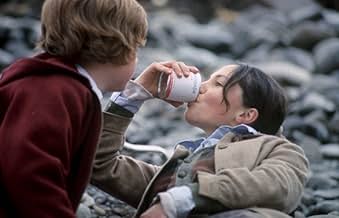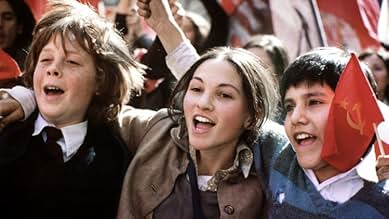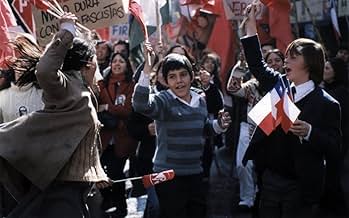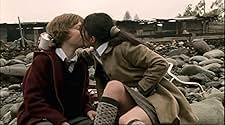IMDb-BEWERTUNG
7,7/10
12.977
IHRE BEWERTUNG
Zwei 12 Jahre alte chilenische Kinder mit unterschiedlichem sozialen Hintergrund werden im Jahr 1973 Freunde. Als die politischen Spannungen in ihrem Land zunehmen, entdecken beide die Welt ... Alles lesenZwei 12 Jahre alte chilenische Kinder mit unterschiedlichem sozialen Hintergrund werden im Jahr 1973 Freunde. Als die politischen Spannungen in ihrem Land zunehmen, entdecken beide die Welt des jeweils anderen.Zwei 12 Jahre alte chilenische Kinder mit unterschiedlichem sozialen Hintergrund werden im Jahr 1973 Freunde. Als die politischen Spannungen in ihrem Land zunehmen, entdecken beide die Welt des jeweils anderen.
- Auszeichnungen
- 13 Gewinne & 8 Nominierungen insgesamt
Aline Küppenheim
- María Luisa Infante
- (as Aline Kuppenheim)
Daniel Alcaíno
- Sargento Ejército
- (as Daniel Alcaino)
Empfohlene Bewertungen
In 1973, the Chilean military, under the direction of General Augusto Pinochet and backed by the CIA, overthrew the shaky socialist government of democratically elected President Salvador Allende. The coup led to the murder of 3,000 leftist Allende supporters and the detention of an estimated 250,000 political prisoners. Set against the background of the political instability that led to the crisis, Andrés Woods' Machuca is the moving story of the friendship between two boys from different sides of the social spectrum. Voted the most popular film at the 2004 Vancouver Film Festival and a major box-office hit in Chile, the semi-autobiographical film succeeds on both a human and a political level, the different elements coming together in a final conflagration.
Gonzalo Infante (Matias Quer) is a chubby, red-faced 11-year old who attends St. Patrick's private school. He lives in a wealthy neighborhood where his security is unquestioned, even though he knows that his mother Maria (Aline Kuppenheim) is having a long-standing affair with a well-to-do Argentine businessman. Gonzalo is shy and inexpressive and is often bullied at school. His life changes, however, when Father McEnroe (Ernesto Malbran), the priest who runs the school, opens St. Patrick's to those who are unable to pay, and Gonzalo develops a friendship with Pedro Machuca (Ariel Mataluna), a youngster who lives in a nearby shantytown. The inclusion of the marginal students causes unrest at the school. Fights break out between the two economic classes and parents hastily call meetings to voice their opposition to the "communist" priest. Gonzalo protects Pedro from the bullies and later visits Pedro in his home.
Aware of how much he has, Gonzalo accepts his status without feeling superior, though Pedro's family refers to him as "the snob". In a subplot, Pedro's seductive young cousin Silvana (Manuela Martelli) gives both boys an introduction to sexual pleasure. Though the relationship between the two boys develops naturally and their innocence allows them to see past the developing turmoil, the disturbing layers of adult events slowly begin to threaten their friendship. To pick up some extra money, the boys attend political rallies and sell Chilean flags to both the Nationalists and the Communists, but soon emotions escalate and street fights break out between far-left and far-right militants. The onset of revolt is signaled by the arrival of two jets flying towards the Presidential Palace, a seminal event in Chile's history that marked the end of their democracy.
One of Chile's most successful young filmmakers, Woods lets the facts speak for themselves, and Machuca makes its points with an emotional power unencumbered by bias or simplistic messages. While the upper middle class is shown as elitist and disdainful of the working class, Pedro's family is also not portrayed in glowing terms. In a drunken rage of victimization, the father tells his son that in a few years, "He (Gonzalo) will be working for Daddy....You'll be cleaning toilets." The children are portrayed as simply children without the false glow of larger-than-life heroism. Although Machuca may ultimately have more of an impact for Chileans who experienced the coup directly, its theme of young people caught in the swirl of events beyond their understanding resonates far beyond the details of this single tragic moment in history.
Gonzalo Infante (Matias Quer) is a chubby, red-faced 11-year old who attends St. Patrick's private school. He lives in a wealthy neighborhood where his security is unquestioned, even though he knows that his mother Maria (Aline Kuppenheim) is having a long-standing affair with a well-to-do Argentine businessman. Gonzalo is shy and inexpressive and is often bullied at school. His life changes, however, when Father McEnroe (Ernesto Malbran), the priest who runs the school, opens St. Patrick's to those who are unable to pay, and Gonzalo develops a friendship with Pedro Machuca (Ariel Mataluna), a youngster who lives in a nearby shantytown. The inclusion of the marginal students causes unrest at the school. Fights break out between the two economic classes and parents hastily call meetings to voice their opposition to the "communist" priest. Gonzalo protects Pedro from the bullies and later visits Pedro in his home.
Aware of how much he has, Gonzalo accepts his status without feeling superior, though Pedro's family refers to him as "the snob". In a subplot, Pedro's seductive young cousin Silvana (Manuela Martelli) gives both boys an introduction to sexual pleasure. Though the relationship between the two boys develops naturally and their innocence allows them to see past the developing turmoil, the disturbing layers of adult events slowly begin to threaten their friendship. To pick up some extra money, the boys attend political rallies and sell Chilean flags to both the Nationalists and the Communists, but soon emotions escalate and street fights break out between far-left and far-right militants. The onset of revolt is signaled by the arrival of two jets flying towards the Presidential Palace, a seminal event in Chile's history that marked the end of their democracy.
One of Chile's most successful young filmmakers, Woods lets the facts speak for themselves, and Machuca makes its points with an emotional power unencumbered by bias or simplistic messages. While the upper middle class is shown as elitist and disdainful of the working class, Pedro's family is also not portrayed in glowing terms. In a drunken rage of victimization, the father tells his son that in a few years, "He (Gonzalo) will be working for Daddy....You'll be cleaning toilets." The children are portrayed as simply children without the false glow of larger-than-life heroism. Although Machuca may ultimately have more of an impact for Chileans who experienced the coup directly, its theme of young people caught in the swirl of events beyond their understanding resonates far beyond the details of this single tragic moment in history.
10dsalvat1
This movie tells a tale on the eve of the darkest hour in Chileann history, where two boys of different social background become friends.
This is a very powerful film, especially for Chileanns and many Latin Americans that suffer the prejudice of classicism (the racism of Latin America) and their ideals being beaten away from them.
You will notice many resentments and insults on this message board as the film gets more exposure due to the fact that some people still live in the past.
I hope this film brings everybody together and shows that no matter what race, religion, sexual orientation or social class, children do not discriminate, everybody feels the same emotions.
Hate is learned by the actions of role models.
This is a very powerful film, especially for Chileanns and many Latin Americans that suffer the prejudice of classicism (the racism of Latin America) and their ideals being beaten away from them.
You will notice many resentments and insults on this message board as the film gets more exposure due to the fact that some people still live in the past.
I hope this film brings everybody together and shows that no matter what race, religion, sexual orientation or social class, children do not discriminate, everybody feels the same emotions.
Hate is learned by the actions of role models.
This is an absolutely wonderful film that captures a very interesting period of history told as a coming-of-age tale from the perspective of three pubescent school children. Like "Diaros de Motocicleta", the recent film about a young Ernesto Guevara, this is NOT simply a political diatribe. It does not romanticize the Allende government or the difficulties (riots, shortages, etc.)that the country went through during his turbulent reign. It certainly doesn't paint the Pinochet coup in a very favorable light, but I don't see how you can make the overthrow of a democratically-elected government and the murder, torture, and disappearance of some 3,000 people look like a wonderful thing. The film portrays many Pinochet supporters either as rich and corrupt or as small-minded, reactionary bullies (which is not entirely inaccurate), but it certainly doesn't shy away from the dark side of the Allende revolution( Allende supporters are shown accosting middle-class Chileans in the street, Allende himself appears in actual TV footage of his notorious meeting with Soviet leader Leonid Breshnev). Really though it would be a shame if continuing political differences stop people from seeing this superb film which really transcends politics to capture the spirit of youth and a time that, as terrible as it was, will never be forgotten.
Our film is shot in Santiago, Chile, and follows two schoolboys shortly before the 1973 military coup. Gonzalo Infante is the son of a wealthy, upper middle class family and goes to a good school. His parents are outraged that children from the poor shanty towns are being introduced to the school and encouraged to mix with their children. Among the shanty town dwellers is the young Pedro Machuca. He and Gonzalo form an increasing bond of friendship as they grow into adolescence. But the gulf between their backgrounds is a powerful one.
The film has been hailed as the most successful Chilean film ever. Made on an apparently tiny budget with help from the UK and Spain, it is anything but small budget in appearance (money from the industrialised European countries goes a long way in Chile!) The story is engaging throughout, and for the Westerner the glimpses into the political history are a window onto a different world.
As there are so many myths surrounding both Allende and Pinochet, I've added a short synopsis that might help as background (and with respect to Chilean scholars I am no expert in the field this sort of information can be gleaned from Amnesty International, recently released USA documents and scholarly sources.
Allende was popularly elected to implement an 'anti-imperialist' program of building socialism within a democratic and constitutional framework in November of 1970. Chile at this time was in the depths of an economic crisis and, like many Latin American countries, had had much of its natural wealth and even ability to manage its own affairs taken by foreign investors, legally and illegally. The lifestyle of the wealthy upper classes contrasted to the poverty of people in the shanty towns, but the educated elite held considerable power. Bent on creating economic chaos, opponents of the new government began deliberately to exacerbate these difficult conditions: the political set off a large exodus of capital, a cessation of private investment, and an extensive withdrawal of bank deposits. nationalizations of American and other foreign-owned companies had sharply increased tensions with the United States, which gave the Nixon administration sufficient excuse to orchestrate an international financial blockade, restricting economic credit to Chile. Simultaneously, C.I.A subsidies were flowing to right-wing media, politicians, and organizations, to assist a campaign of domestic destabilization.
Allende committed suicide in the final stages of the CIA-backed military coup led by Pinochet. The United States had ran covert actions in Chile between 1963 and 1973 leading to the ascension of General Pinochet. The US Government's official report of the operations said it epitomized CIA covert actions (worldwide). However brutal the Pinochet government, it was 'good' for US interests. Thus began 17 years of dictatorship which ended March 11, 1990. According to Amnesty International and the United Nations' Human Rights Committee, 250,000 Chileans had been detained for political reasons by the end of 1973. In 1990, having failed in his bid to gain popular ratification for his rule, Pinochet handed over the presidency to the rightfully- elected Patricio Aylwin Azocar. Chile now has a market economy and the political climate has since remained stable, although there is still considerable tension between the military and the government concerning human rights violations of the Pinochet era. Pinochet still retains a considerable group of supporters, both inside and outside the country and the myths and stereotypes he generated still haunt the political future of Latin America. Some still vividly remember the social anarchy (hyperinflation, expropriation, land invasions and violent confrontations) under the socialist policies of Allende. The more important reason, however, is Chile's economic performance. Without the direct and intentional destabilising influence, and with opponents or poor people simply exterminated, the economy improved. In the weeks that followed the coup, thousands of unionists, socialists, students and left-wing activists were raped, tortured, starved and murdered. extermination of thousands of civilians in South America, but the remaining elite were protected and international relations 'normalised'. As Gonzalo's father says in the film: 'Socialism is good for Chile ... it's just not good for us.'
The film has been hailed as the most successful Chilean film ever. Made on an apparently tiny budget with help from the UK and Spain, it is anything but small budget in appearance (money from the industrialised European countries goes a long way in Chile!) The story is engaging throughout, and for the Westerner the glimpses into the political history are a window onto a different world.
As there are so many myths surrounding both Allende and Pinochet, I've added a short synopsis that might help as background (and with respect to Chilean scholars I am no expert in the field this sort of information can be gleaned from Amnesty International, recently released USA documents and scholarly sources.
Allende was popularly elected to implement an 'anti-imperialist' program of building socialism within a democratic and constitutional framework in November of 1970. Chile at this time was in the depths of an economic crisis and, like many Latin American countries, had had much of its natural wealth and even ability to manage its own affairs taken by foreign investors, legally and illegally. The lifestyle of the wealthy upper classes contrasted to the poverty of people in the shanty towns, but the educated elite held considerable power. Bent on creating economic chaos, opponents of the new government began deliberately to exacerbate these difficult conditions: the political set off a large exodus of capital, a cessation of private investment, and an extensive withdrawal of bank deposits. nationalizations of American and other foreign-owned companies had sharply increased tensions with the United States, which gave the Nixon administration sufficient excuse to orchestrate an international financial blockade, restricting economic credit to Chile. Simultaneously, C.I.A subsidies were flowing to right-wing media, politicians, and organizations, to assist a campaign of domestic destabilization.
Allende committed suicide in the final stages of the CIA-backed military coup led by Pinochet. The United States had ran covert actions in Chile between 1963 and 1973 leading to the ascension of General Pinochet. The US Government's official report of the operations said it epitomized CIA covert actions (worldwide). However brutal the Pinochet government, it was 'good' for US interests. Thus began 17 years of dictatorship which ended March 11, 1990. According to Amnesty International and the United Nations' Human Rights Committee, 250,000 Chileans had been detained for political reasons by the end of 1973. In 1990, having failed in his bid to gain popular ratification for his rule, Pinochet handed over the presidency to the rightfully- elected Patricio Aylwin Azocar. Chile now has a market economy and the political climate has since remained stable, although there is still considerable tension between the military and the government concerning human rights violations of the Pinochet era. Pinochet still retains a considerable group of supporters, both inside and outside the country and the myths and stereotypes he generated still haunt the political future of Latin America. Some still vividly remember the social anarchy (hyperinflation, expropriation, land invasions and violent confrontations) under the socialist policies of Allende. The more important reason, however, is Chile's economic performance. Without the direct and intentional destabilising influence, and with opponents or poor people simply exterminated, the economy improved. In the weeks that followed the coup, thousands of unionists, socialists, students and left-wing activists were raped, tortured, starved and murdered. extermination of thousands of civilians in South America, but the remaining elite were protected and international relations 'normalised'. As Gonzalo's father says in the film: 'Socialism is good for Chile ... it's just not good for us.'
I watched the film with my mother, who lived through the coup d'etat in Chile. The events depicted in the movie were so realistic, they transported her back to that era. She cried as we watched and explained all of the small details I wouldn't have gotten being someone who didn't experience these events for myself. With this in mind, I have to think this movie was meant to be watched by a Chilean audience to be fully understood and "felt". Someone like my mother, who has seen the atrocities that occurred in Chile in the mid-seventies, would be a more appropriate critic of this film.
Regardless, I think everyone should watch this movie. It is a touching story about friendship, growing up, social classes, and politics. The acting was exceptional. The plot was well- written. The sets, props, and costumes were accurate. It has a lot to offer as an enlightening and educational film since the story of Chile's own 9/11 has not yet reached the general masses. Because the story is told through a sentimental child's perspective, you are drawn yet closer to the characters and their emotions. Some have criticized this film harshly, stating that Wood couldn't make up his mind whether this film is a political story or a child's coming-of-age tale. Why can't it be both?
As a Chilean, I am extremely proud of this film, in its quality and accuracy. It is powerful, bold and touched me to my very core. I strongly recommend it to all, especially all of you Chilean-Americans born during this era. Ask your parents to tell you their own story, and you will see that Machuca is more than a piece of cinematic brilliance and a milestone in Chilean film. It is a film you will never forget.
Regardless, I think everyone should watch this movie. It is a touching story about friendship, growing up, social classes, and politics. The acting was exceptional. The plot was well- written. The sets, props, and costumes were accurate. It has a lot to offer as an enlightening and educational film since the story of Chile's own 9/11 has not yet reached the general masses. Because the story is told through a sentimental child's perspective, you are drawn yet closer to the characters and their emotions. Some have criticized this film harshly, stating that Wood couldn't make up his mind whether this film is a political story or a child's coming-of-age tale. Why can't it be both?
As a Chilean, I am extremely proud of this film, in its quality and accuracy. It is powerful, bold and touched me to my very core. I strongly recommend it to all, especially all of you Chilean-Americans born during this era. Ask your parents to tell you their own story, and you will see that Machuca is more than a piece of cinematic brilliance and a milestone in Chilean film. It is a film you will never forget.
Wusstest du schon
- WissenswertesAs stated by the director in several interviews, the movie was shot only on Sundays, due to its small budget.
- PatzerSilvana is standing by the outhouse, then moments later, after camera pans, appears on the other side of Gonzalo.
- Zitate
Patricio Infante: Socialism might be better for Chile but not for us.
- Crazy CreditsIn the credits at the beginning of the film, the last letter of each word drifts slowly to the right separating from the names
- VerbindungenFeatured in Sin maquillaje: Tamara Acosta (2013)
- SoundtracksAi Amor
Written and performed by Buddy Richard
Top-Auswahl
Melde dich zum Bewerten an und greife auf die Watchlist für personalisierte Empfehlungen zu.
- How long is Machuca?Powered by Alexa
Details
- Erscheinungsdatum
- Herkunftsländer
- Offizieller Standort
- Sprachen
- Auch bekannt als
- Machuca
- Drehorte
- Produktionsfirmen
- Weitere beteiligte Unternehmen bei IMDbPro anzeigen
Box Office
- Budget
- 1.500.000 $ (geschätzt)
- Bruttoertrag in den USA und Kanada
- 26.676 $
- Eröffnungswochenende in den USA und in Kanada
- 4.635 $
- 23. Jan. 2005
- Weltweiter Bruttoertrag
- 3.187.700 $
- Laufzeit1 Stunde 56 Minuten
- Farbe
- Sound-Mix
- Seitenverhältnis
- 1.85 : 1
Zu dieser Seite beitragen
Bearbeitung vorschlagen oder fehlenden Inhalt hinzufügen

Oberste Lücke
By what name was Machuca, mein Freund (2004) officially released in India in English?
Antwort


